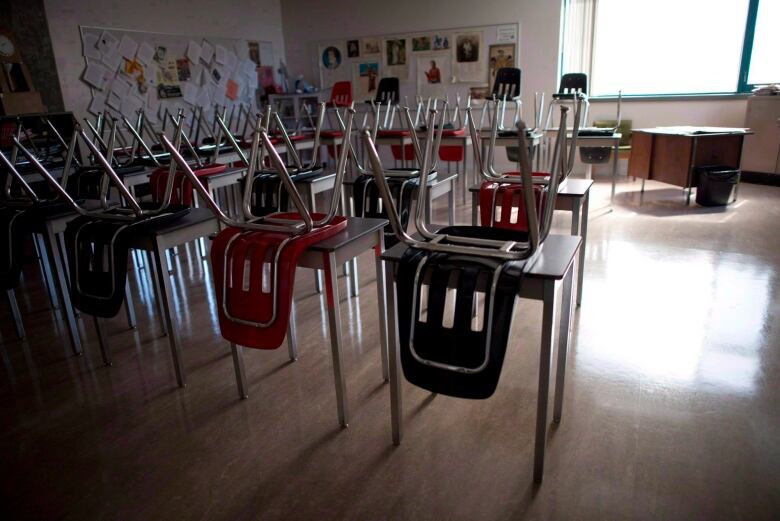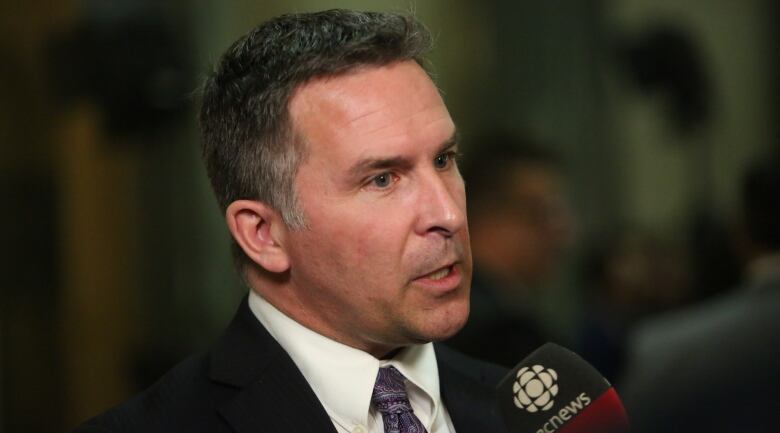Class size must be included in new teacher deal to hold government accountable: STF
Education Minister Gordon Wyant proposes new bargaining that will not address teachers' top concerns

A new agreement could be struck to examine class size and compositionbut the issue won't be on the table as the Saskatchewan Teachers' Federation and Government and Trustee Bargaining Committee (GTBC) work toward a new collective agreement for the province's teachers.
The Ministry of Education has said previously it won't be negotiating class size and composition at the tablebut on Wednesday, Minister Gordon Wyantinsteadproposed establishing a separate negotiating table to examine the issue without class size.
"We would bring all of our education partners together to have a conversation about how we can deal with what's obviously a significant issue in the classrooms in Saskatchewan," said Wyant.
Wyant said he isn't ready to agree with the STF in having class sizes as part of a collective bargaining agreement between governments, schools boards and the Saskatchewan Teachers' Federation.
Wyantcalledthe conversation "greater than the STF."
[Wyant] wants to make it look like government is doing something to fix education when in reality he's not coming up with any tangible commitment- Patrick Maze, Saskatchewan Teachers' Federation
The Saskatchewan Teachers' Federation (STF) disagrees and said class sizes are a top priority for teachers and must be included in negotiations.
While the organizationwelcomes the recognition of class-size and composition as an important issue in the province, it says the government is"lacking specifics" on the table'smandate, how the team would function and how it would be held accountable.
The two parties have committed to releasing updates as the bargaining process unfolds, which is considered a rare move, as contract negotiations usually take place behind closed doors.
In its offer, the provincial bargaining committee put forward a three-year deal that would see teachers get a one-time, $1,500 payment per full-time teacher in 2019-20 and an annual two per cent salary increase over the next two years.
The union is asking for smaller class sizes, a three-year agreement with a two per cent salary increase in 2019-20, increases of three per cent in 2020-21 and three per cent in 2021-22, and a contract of employment for substitute teachers.

"Simply offering a conversation and offering a provincial table, I think, is a pretty good commitment, on behalf of the province of Saskatchewan and as the Minister of Education, that we understand it's a significant issue that needs to be addressed and it's a very complex issue," Wyant said, noting each school division has a unique set of issues they're trying to address.
"In some school divisions, class sizes and composition is a significant issue and others, it's not," he said. "To have a blanket approach in a collective agreement, I don't think is the right way to go."
Patrick Maze, President of the Saskatchewan Teachers' Federation, said the 50 per cent of teachers the STF has surveyed feel that class size and composition is a top priority in Saskatchewan, even before salary.

Maze said teachers want to see class-size and composition included in contract negotiations, but said it is encouraging to see Minister Wyant recognizing the issue needs to be addressed.
Still, Mazesays it needs to be in the contract.
"For us, that is where we want to fix this," said Maze.
"We know that if it's not dealt with at the bargaining table, then government really doesn't have the same level of accountability that is contained within the parameters of a collective agreement."
Maze said there are already several committees examining issues within the education sector, noting if the issue hasn't been addressed by these groups, he doesn't have faith another committee can solve the problem.
"He wants to make it look like government is doing something to fix education when in reality he's not coming up with any tangible commitment to do," said Maze of Wyant's proposal, calling any conversations around class-size and composition away from the table is a "non-starter."
"Kicking the can down the road by forming another committee is simply not the answer we need," Maze said.
Wyant said he has already instructed his deputy minister to start developing a framework for the new table, saying these conversations need to happen quickly.
The STF says the teachers bargaining committee would welcome the opportunity to discuss specific details of how the proposed committee would alleviate the pressure on today's classrooms with Minister Wyant.
The STF has been without a contract since Aug. 31, 2019.












_(720p).jpg)


 OFFICIAL HD MUSIC VIDEO.jpg)
.jpg)



























































































